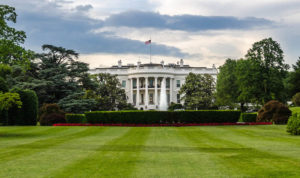
A federal judge strikes down a public transportation mask mandate, DHS extends vaccine requirements for non-U.S. travelers entering the country, and more…
IN THE NEWS
- A federal judge in Florida struck down the Centers for Disease Control and Prevention (CDC) mandate that required masks on airplanes and other forms of public transportation. The Transportation Security Administration had recently extended the mask requirement until May 3, 2022. Following the judge’s mandate, several airlines announced that wearing masks on their aircraft is now optional. White House Press Secretary Jen Psaki described the ruling as “disappointing” and said the CDC continues recommending wearing a mask in public transit. The U.S. Department of Justice appealed the ruling following a CDC recommendation stating that the mask mandate is still necessary to protect public health.
- The U.S. Department of Homeland Security (DHS) extended COVID-19 vaccine requirements for non-U.S. travelers entering the country at the Mexico and Canada borders by land or ferry. U.S. citizens, nationals, and lawful permanent residents are excluded from the requirements, which also do not apply to air travel. DHS Secretary Alejandro Mayorkas said that the decision to extend the vaccine requirements came after DHS consulted with the CDC and that it affirmed the Biden Administration’s commitment to “protecting public health.”
- The U.S. Department of Education announced several changes to its federal student loan program, including ending “forbearance steering”— a practice where lenders allow borrowers to pause payments but the loans still accrue interest—and making adjustments to borrowers’ accounts to remedy the harms of such actions. The Education Department projected that these changes will result in debt cancellation for at least 40,000 borrowers under its Public Service Loan Forgiveness Program and that they will provide an additional three years of credit toward income-driven repayment forgiveness to 3.6 million borrowers. This announcement follows complaints from consumer-protection nonprofits, such as the Student Borrower Protection Center, alleging that the Education Department has mismanaged income-driven repayment plans. The Board of Governors of the Federal Reserve System has estimated that Americans owe more than $1.7 trillion in student loans.
- The U.S. Department of the Interior announced that the Bureau of Land Management would resume oil and gas leasing for drilling on public lands. Secretary of the Interior Deb Haaland explained that the reformed leasing process would now include community and Tribal input and climate impact considerations. Critics, including Randi Spivak of the Center for Biological Diversity, denounced the Administration’s move as a “reckless failure of climate leadership” and noted that President Biden violated a campaign promise to cease drilling on public lands.
- The White House Council on Environmental Quality (CEQ) issued amendments to its National Environmental Policy Act (NEPA) regulations, restoring provisions that the Trump Administration modified in 2020. Under NEPA, federal agencies must assess the environmental impacts of proposed decisions and consider reasonable alternatives. The CEQ reinstated a definition of “effects” that requires agencies to evaluate the direct, indirect, and cumulative environmental impacts of a proposed action. The CEQ also reestablished agency flexibility in adopting their own NEPA procedures and removed limitations on the scope of “reasonable alternatives” an agency must consider in the “purpose and need” of a proposed project. CEQ chair Brenda Mallory explained that the revisions “will provide regulatory certainty, reduce conflict, and help ensure that projects get built right the first time.”
- The Office of Management and Budget (OMB) issued guidance to facilitate federal agencies’ identification and reduction of burdens that hinder access to public benefits programs. The OMB provided guidance on the Paperwork Reduction Act of 1995, which governs how agencies collect the information of individuals seeking assistance from government programs. Specifically, the OMB encouraged agencies to engage with the public to understand better their experiences when applying for benefits. The OMB also encouraged agencies “to consider policy, communication, technological, and design reforms” to facilitate the public’s access to services.
- The City of Philadelphia reinstated—and then rescinded—a mask mandate for all indoor public spaces, including “schools, businesses, museums, restaurants, offices, and government buildings.” The mandate followed an increase in the number of COVID-19 infections counted in Philadelphia of over 50 percent in the past 10 days. Philadelphia’s mandate would have still allowed businesses and institutions that required everyone on-site to be fully vaccinated and provided proof of that vaccination to remain mask-free. The Philadelphia Department of Public Health had argued that the mask mandate would help protect the city’s most vulnerable residents and keep hospitals from being overrun by COVID-19 infections.
WHAT WE’RE READING THIS WEEK
- In a forthcoming article in The University of Chicago Business Law Review, Jill E. Fisch, a professor at the University of Pennsylvania Carey Law School, explored how shareholders are using the U.S. Securities and Exchange Commission’s shareholder proposal rule to advance commitments to reform corporate purpose, which is traditionally defined as maximizing shareholder value. Fisch argued that shareholders are turning to “purpose proposals” as vehicles to formalize their commitment to shift governance in line with the global movement to maximize social, or stakeholder, benefits. Fisch stated that the voting power of institutions who serve as intermediaries limits the effectiveness of purpose proposals because they are only agents to those who hold economic interest in companies, resulting in “empty voting.”
- In a Brookings Institution report, Leah Hamilton, a professor at Appalachian State University, and several coauthors, discussed the impacts of the recently expanded child tax credit (CTC). Hamilton and her coauthors compared the financial, nutritional, and employment outcomes of families before and after receiving six months of CTC payments. Hamilton and her coauthors found that families that received CTC payments experienced improved health and financial well-being and were able to make long-term educational investments in their children. Hamilton and her coauthors concluded that such outcomes were significant for eligible Black, Hispanic, and other minority families.
- In a Center for American Progress report, Trevor Higgins, vice president for climate policy at the Center, argued that increased amounts of clean energy will reduce household energy costs and protect the U.S. economy against the unpredictable costs associated with fossil fuels. Higgins noted that in the United States it is now less expensive to build new solar and wind projects than to continue operating coal-fired power plants. Higgins predicted that if the U.S. power grid relies more on wind and solar electricity than on fossil fuels, natural gas prices will drop and consumer gas bills will decrease. Higgins also stressed that making a shift to renewable sources of energy would reduce the costs associated with the fossil fuel industry’s vulnerability to extreme weather, citing extreme weather in Texas in 2021 that knocked out half of the state’s power. Higgins concluded that because fossil fuels are becoming increasingly more volatile and expensive, policy makers should take immediate steps to invest in and encourage the use of clean energy.
EDITOR’S CHOICE
- In an essay for The Regulatory Review, Katherine Florey, professor at the University of California, Davis, School of Law, examined how Indigenous communities acted swiftly to mitigate the effects of COVID-19. Florey found that tribes recognized the significant danger of the pandemic early on and acted accordingly, implementing curfews, mass testing, and stay-at-home orders to become a “model of pandemic response.” Florey reasoned that, although tribal governments face unique regulatory challenges, their ability to be “nimbler and more responsive” is a benefit in the face of COVID-19.



